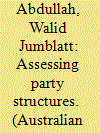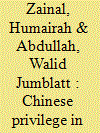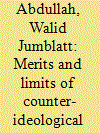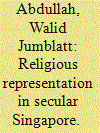|
|
|
Sort Order |
|
|
|
Items / Page
|
|
|
|
|
|
|
| Srl | Item |
| 1 |
ID:
146528


|
|
|
|
|
| Summary/Abstract |
This article attempts to answer the puzzle of why, amongst undemocratic states, some regimes are more authoritarian than others. The author contends that differing party structures result in different authoritarian outcomes. A ruling, competitive authoritarian regime that has a party structure akin to a cadre party, or where there is little or no intra-party democracy, is more likely to be more authoritarian than a party which has intra-party democracy. The lack or absence of intra-party democracy ensures that elites remain cohesive and that there are lesser opportunities for the opposition to take advantage of divisions in the party, whereas in a party with intra-party democracy, there is a greater possibility of elite disunity, which could be capitalised on by the opposition, and there is also a greater likelihood of a different ideology being propagated by defectors from the party. The cases of the People's Action Party in Singapore and the United Malays National Organization in Malaysia are used to illustrate the author's case.
|
|
|
|
|
|
|
|
|
|
|
|
|
|
|
|
| 2 |
ID:
178056


|
|
|
|
|
| Summary/Abstract |
This article contributes to a more nuanced understanding of privilege as a conceptual category through the case study of Chinese privilege in Singapore politics. It does so through two main ways. First, at the theoretical level, we emphasise the importance of foregrounding the salience of political hegemony in the analysis of privilege. Second, at the empirical level, we interrogate the concept in an Asian context, with specific reference to Singapore. We argue that the existing focus on class privilege within the ruling People’s Action Party (PAP) should go hand-in-hand with the study of Chinese privilege since PAP hegemony has significant implications on how race is constructed, understood and implicated in Singapore politics and society. Furthermore, PAP’s race-based approach to politics inadvertently perpetuates Chinese privilege, as exemplified by contradictions in minority representation in parliament and the clash between Chinese privilege and the government’s system of meritocracy.
|
|
|
|
|
|
|
|
|
|
|
|
|
|
|
|
| 3 |
ID:
152025


|
|
|
|
|
| Summary/Abstract |
Counter-ideological work is touted as crucial in combating terrorism. This article attempts to analyse the role of counter-ideology in dealing with a particular type of terrorism: Muslim jihadist extremism. This paper reiterates findings from existing research, in arguing that counter-ideology is indispensable for three reasons: firstly, to prevent Muslims from genuinely believing that terrorism is sanctioned by the faith; secondly, it is instructive to assure non-Muslims that Islam per se, is not the problem; and finally, it can be used to ‘rehabilitate’ terrorists who are in detention. However, this paper also suggests four criticisms of many counter-ideological efforts, and posit that in order for such work to be truly effective, the following shortcomings need to be rectified: firstly, the creation of unnecessary frontiers that may alienate potential allies; secondly, the inability to ‘preach to the right crowd’; thirdly, the perils of promoting ‘moderate’ and ‘progressive’ Islam; and finally, credibility issues associated with the people spearheading such works. An underlying factor that lurks in the background of all of these is the role of the ulama, or Islamic religious scholars. This article further hopes to contribute to the literature on counter-terrorism by exercising more scrutiny on the role of the ulama.
|
|
|
|
|
|
|
|
|
|
|
|
|
|
|
|
| 4 |
ID:
126968


|
|
|
|
|
| Publication |
2013.
|
| Summary/Abstract |
This paper investigates the nature of secularism practiced by the Singapore state, focusing on the two main Islamic organizations, MUIS and Pergas. I postulate that the state uses "muscular" and "calibrated" secularism to manage them, and co-opts them either formally or informally. The two organizations agree to such an arrangement.
|
|
|
|
|
|
|
|
|
|
|
|
|
|
|
|
| 5 |
ID:
186606


|
|
|
|
|
| Summary/Abstract |
This paper investigates the Singapore state’s varied responses toward dissent and explores the modes of control employed by the state towards varied dissent. We argue that any attempt to understand the politics of control in Singapore is incomplete without understanding how the state calibrates liberalisation as a third primary strategy. This study contributes to a more nuanced comprehension of how hybrid regimes can expand their modes of control. It offers a new framework to understand how tools of dominance are calibrated to adapt to a shifting socio-political landscape and calls for viewing liberalisation as a method of extending control.
|
|
|
|
|
|
|
|
|
|
|
|
|
|
|
|
| 6 |
ID:
183932


|
|
|
|
|
| Summary/Abstract |
This paper investigates the relationship between the state and Islam in Malaysia under the previous Barisan Nasional (BN) regime, focusing on the role of the ulama (Islamic religious scholars). Interactions between the ulama and the state redefine, or have the potential to do so, the contours of both the state and Islam. Drawing upon the concept of political opportunities, the paper argues that the more liberating the political opportunities are for the ulama, the more the state has to acquiesce to their demands, and thus, the ulama’s understandings of Islam. In Malaysia, wide political opportunity structures enable the ulama to drive rising conservatism, both with regard to the state and Malaysian society. The process of defining Islam is not static, as the case of Malaysia demonstrates, since the ulama adjust the definitions of Islamic concepts based on socio-political conditions. This study is situated within the literature on state-society relations, and Islam in politics.
|
|
|
|
|
|
|
|
|
|
|
|
|
|
|
|
|
|
|
|
|